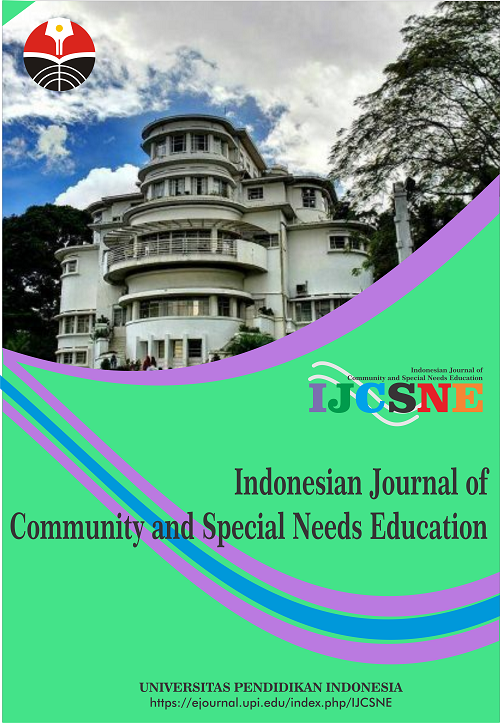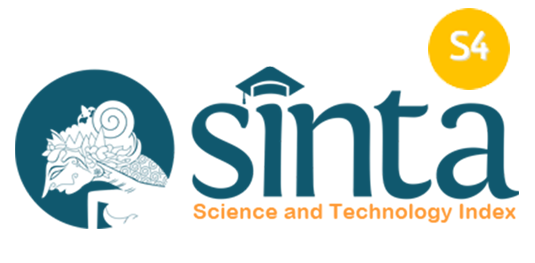Social Skills Profile of Children with Visual Impairments
Abstract
This study explores the social skills profile of children with visual impairments (ADHP). The program aims to provide educational services while children receive ophthalmological treatment. Employing a qualitative descriptive design, data were collected through observations, interviews with parents and teachers, and document analysis. The research focused on two core questions: (i) What are parents’ expectations for the development of their children’s social skills? and (ii) What aspects define the social skills of ADHP participants in this program?. Findings revealed high parental expectations across four key areas: the development of basic orientation and mobility skills, enhanced self-confidence, improved social interaction, and increased school motivation. The study also identified three social skills dimensions: peer interaction, expressing needs and preferences, and task engagement. These insights can guide future intervention models to support inclusive education.
Keywords
Full Text:
PDFReferences
Abiodun, T.O., Chinaka, T.W., and Asanre, A.A. (2025). The role of students’ motivation and self-concept as predictors of mathematics performance in secondary schools. Indonesian Journal of Multidiciplinary Research, 5(1), 21-28.
Al Husaeni, D.F., and Nandiyanto, A.B.D. (2022). Animation for educating, socializing, and giving understanding characteristics of malnourished children. Indonesian Journal of Teaching in Science, 2(2), 147-154.
Anthony, T. L., and Fazzi, D. L. (2003). Social skills and positive self-concepts: Critical components of transition for students with visual impairments. Journal of Visual Impairment and Blindness, 97(6), 329–338.
Astuti, E. (2017). Peran guru dalam meningkatkan motivasi belajar anak berkebutuhan khusus. Jurnal Ilmiah Pendidikan Khusus, 4(2), 56–65.
Bolaji, H.O., and Ajia, I.S. (2023). Information and communication technology (ICT) integration: A veritable technique for quality secondary education. ASEAN Journal of Educational Research and Technology, 2(2), 137-144.
Bolaji, H.O., and Ibrahim, B.F. (2023). Accessibility and usability of information and technology communication: Application for record-keeping among secondary school administrators. Indonesian Journal of Educational Research and Technology, 3(3), 191-202.
Braquez, H.A., and Morbo, E.A. (2024). Coaching competencies and sports-facility utilization: Their influence on the commitment and psychological well-being of student-athletes. ASEAN Journal of Community and Special Needs Education, 3(1), 59-70.
Celeste, M. (2006). Play behaviors and social interactions of a child who is blind: In theory and practice. Journal of Visual Impairment and Blindness, 100(2), 75–90.
Deci, E. L., and Ryan, R. M. (2000). The "what" and "why" of goal pursuits: Human needs and the self-determination of behavior. Psychological Inquiry, 11(4), 227–268.
Erwin, E. J. (1993). Social participation of young children with visual impairments in specialized and integrated environments. Journal of Visual Impairment and Blindness, 87(5), 138–142.
Farida, F., Supardi, S., Abduh, A., Muchtar, J., Rosmaladewi, R., and Arham, M. (2024). Technology and hybrid multimedia for language learning and cross-cultural communication in higher education. ASEAN Journal of Science and Engineering, 4(2), 331-348.
Fitriah, F., and Indrakurniawan, M. (2025). Influence of self-efficacy on learning motivation among primary school students. Indonesian Journal of Multidiciplinary Research, 5(1), 165-174.
Glushchenko, V.V. (2025). Formation of the methodology of the project-activity game in inclusive higher education. Indonesian Journal of Multidiciplinary Research, 5(1), 53-58.
Hafina, A. (2024). Analysis of students' needs for guidance and counseling services based on personal, social, academic, and career competency standards. Indonesian Journal of Multidiciplinary Research, 4(1), 17-26.
Hidayat, A. (2018). Pembelajaran keterampilan sosial pada anak berkebutuhan khusus. Jurnal Pendidikan Khusus, 7(1), 55–61.
Jamiu, L.A. (2023). Impact of communicative language test assessments in enhancing learners' capacity. ASEAN Journal of Educational Research and Technology, 2(2), 109-116.
Kamble, A.D.K., and Gaikwad, H.V. (2021). How should the education system approach children with special needs? Indonesian Journal of Community and Special Needs Education, 1(1), 15-18.
Khimmataliev, D.O., and Ergashevna, B.K. (2025). Family crises: Psychological dynamics and strategies for resolution. ASEAN Journal of Community and Special Needs Education, 4(1), 1-10.
Marini, A., and Suryadi, D. (2020). Meningkatkan percaya diri anak berkebutuhan khusus melalui pendekatan sosial emosional. Jurnal Bimbingan dan Konseling, 9(1), 22–29.
Preisler, G. M. (1993). Early communication in blind infants: Developmental aspects. Child: Care, Health and Development, 19(6), 295–315.
Riggio, R. E. (1986). Assessment of basic social skills. Journal of Personality and Social Psychology, 51(3), 649–660.
Roe, J. (2008). Social inclusion: Meeting the social and emotional needs of children with vision needs. British Journal of Visual Impairment, 26(2), 147–158.
Silvia, C., and Clark, M. (2005). Social participation of children with visual impairments in inclusive settings. Journal of Visual Impairment and Blindness, 99(8), 494–505.
Siregar, M. R. (2021). Penerapan latihan orientasi dan mobilitas di lingkungan rumah bagi anak tunanetra. Jurnal Psikopedagogia, 10(1), 23–30.
Situngkir, S., Salis, M.I., and Aqila, K.T. (2024). Effect of religion, gender, and overconfident interactions on investment decisions tiar lina. ASEAN Journal of Religion, Education, and Society, 3(1), 37-50.
Suharto, T. (2018). Teknik dasar orientasi dan mobilitas bagi anak dengan hambatan penglihatan. Jurnal Pendidikan Khusus, 4(1), 15–22.
Sulyman, H.T., and Yetunde, L.K. (2023). Effect of rhymes on social skill acquisition of children with special needs. ASEAN Journal of Community and Special Needs Education, 2(2), 69-80.
Wardani, F., and Astuti, S. (2020). Keterampilan dasar mobilitas anak tunanetra dalam aktivitas sehari-hari. Jurnal Ilmiah Pendidikan Khusus, 8(3), 40–48.
Wardani, F., and Yuliasih, E. (2020). Pengembangan keterampilan sosial anak tunanetra di lingkungan sekolah. Jurnal Ilmiah Pendidikan Khusus, 8(2), 33–41.
Wolffe, K., and Kelly, S. M. (2011). Instruction in the areas of social skills and career education for students with visual impairments in different placement settings. Journal of Visual Impairment and Blindness, 105(10), 581–592.
Yuniarti, W. (2018). Peran keluarga dalam meningkatkan kepercayaan diri anak tunanetra. Jurnal Ilmiah Pendidikan Khusus, 6(1), 15–21.
Yusuf, S., Abdulkareem, H.B., and Popoola, B.O. (2023). The impact of quality early childhood education centers on pre-schoolers’ social interaction. Indonesian Journal of Multidiciplinary Research, 3(2), 181-190.
DOI: https://doi.org/10.17509/ijcsne.v5i2.86166
Refbacks
- There are currently no refbacks.
Copyright (c) 2025 Universitas Pendidikan Indonesia

This work is licensed under a Creative Commons Attribution-ShareAlike 4.0 International License.















